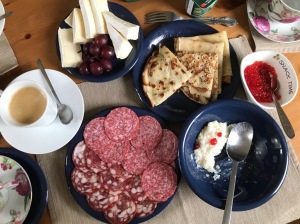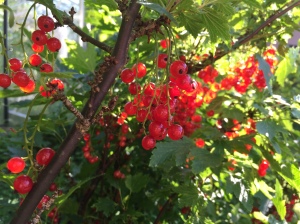“If so, better let him be named after his father. His father was Akaky, so let the son also be Akaky. Thus it was that Akaky Akakievich came about. As the child was being baptised, he cried and made such a face as if he anticipated that he would be a titular councillor.”
The Overcoat by Nicholai Gogol
 It seems that Putin and Zuma have formed an unholy alliance. Plus ça change, plus c’est la même chose. I hear your groans. I see your rolled eyes.
It seems that Putin and Zuma have formed an unholy alliance. Plus ça change, plus c’est la même chose. I hear your groans. I see your rolled eyes.
But there is a silver lining.
As of 31st March 2017, South Africans have visa-free travel to Russia and Belorussia. If you itch to travel the world and experience different cultures, now is your chance. Go! Go to Mother Russia!
Enjoy sailing past the Brits and Aussies at passport control. Hold your head high, oh bearers of the Great Green Mamba!
Pavlovsk
On 11 December Mamma, Hubby and I arrived in Pavlovsk. Pavlovsk is a ‘suburb’ of greater St Petersburg. The town’s biggest attraction is the Summer Palace of Czar Paul I (Pavel I). The palace was built for Paul and his wife, the German duchess, Maria Feodorovna. Sadly Czar Pavel I lived for just 40 days after the completion of his palace. He was murdered by conspirators who got his son Alexander involved in his father’s deposition. Paul I had become mad with paranoia and Alexander agreed that his father should be removed from power. It’s believed that Alexander was unaware of the conspirator’s real murderous intentions. Czar Alexander I evidently suffered from guilt about the circumstances surrounding his father’s death for the rest of his life. Pavel’s German wife, Maria Feodorovna outlived him another 28 years. The film, Бедный Бедный Павел (Poor, Poor Pavel) (2003) tells the sad story of Czar Paul I – definitely worth a watch, though somewhat humorously caricatured.
And so, we began our Russian trip with mad Pavel and a walk through his beautiful Palace and grounds, hot cabbage soup and the unavoidable advice from the babushki on guard. Chandeliers, precious jewels, a library of leather-bound French books, gold gilt and marble statues – the Russian Czars really knew how to put the P in palatial.
Peterhof
From Pavlovsk to Peterhof. Unsurprisingly Peterhof is the summer palace of Peter the Great. This series of palaces, ornate gardens and dramatic fountains were built on the bank of the Baltic Sea by order of Peter himself to rival the Palace of Versailles. The exquisite and super creative fountains of Peterhof attract thousands of tourists every summer. It was at Peterhof, that we first encountered the greatest number of selfie-snapping Chinese outside the Republic of China. It was also the most expensive place to buy a bottle of water (300ml water in Peterhof = 180 Roubles; St Petersburg Metro shop 500ml water 50 Roubles).
Below, I give you, the quacking and barking fountain:
A note on the pronunciation of Peterhof: Russians do not have a letter/sound in Cyrillic for the Roman letter ‘H’. What to do? There are 3 options: 1) Drop the ‘H’ e.g. отель (translit: Otel) comme en français. 2) Use the Cyrillic ‘X’ (as in throat-wrenching ‘ch’ ending of ‘loch’ – Scottish lake). Cue ‘Hello’ in Bond villain Russian accent. 3) My personal favourite and evidently theirs too, the use of Cyrillic letter ‘г’ (Roman letter ‘G’ for ‘golf). This results in some hilarious incidences of Prince Gary, Garry Potter and Petergof.
Pushkin
Paul, Peter, now Pushkin. The St Petersburg suburb of Pushkin is named after Alexander Pushkin, the Russian poet, playwright, and novelist considered to be one of the greatest Russian poets and founder of modern Russian literature. I can recommend his play Eugene Onegin (published 1832). If you ever get the chance, go and see the opera version composed by Tchaikovsky. It’s a timeless story of love and death … but now I’m burbling.
At Pushkin the great attraction is Catherine’s Palace. It was built for Catherine I of Russia in 1717. It is beautiful early Baroque style palace with gardens and lake. Incidentally, we visited Catherine’s Palace in December 2015 and it was there that I had my first ever walk on a frozen lake. It was strange to visit again in summer and to sit on the edge of the water licking a pistachio ice-cream.
Alexander
Countless spy stories, Bond films and action-packed skiet en donner flieks have told all about Russians. They are villains, they never smile and are mostly called Sergei or Alexander. I’m here to tell you that behind the miss-matched outfits, harsh linguistic tones and stern brows, you will find, in time, the generous, warm heart of the Russian people.
Sasha is one of scores of diminutive forms of the popular Russian boys’ name, Alexander. Sasha* is also the name of our ballet-loving, straight-faced, dry-sense-of-humoured, каша-eating, moustachioed host in Pavlovsk, St Petersburg. The Russian face is hard to read. They don’t smile and offer a variety of empty politenesses like we do in the West, but when they are your friend, they are your friend and they’ll give you their warmest and only overcoat in a snowstorm.
 Talking about names … we were wined and dined by Sasha and his wife, who insisted on calling my Mamma, ‘Lady Dee’. In Russia, Deniz is a male name only so they could not call her ‘Denise’. When she explained that she’s always been known as Dee*, they immediately nodded with relief, “Aaahhhh, Lady Dee’!” they said in unison. The way we pronounce ‘Dee’ (long ‘e’ sound) is the way Russians pronounce ‘Di’. The only Dee/Di Russians know and love is a certain English Princess who died 20 years ago this month. So from that moment on, Mamma was ‘Lady Dee’, and fitting the name is!
Talking about names … we were wined and dined by Sasha and his wife, who insisted on calling my Mamma, ‘Lady Dee’. In Russia, Deniz is a male name only so they could not call her ‘Denise’. When she explained that she’s always been known as Dee*, they immediately nodded with relief, “Aaahhhh, Lady Dee’!” they said in unison. The way we pronounce ‘Dee’ (long ‘e’ sound) is the way Russians pronounce ‘Di’. The only Dee/Di Russians know and love is a certain English Princess who died 20 years ago this month. So from that moment on, Mamma was ‘Lady Dee’, and fitting the name is!
A note on diminutives: Russians believe fervently in diminutives. Even the answer to ‘How are you?’ (Как дела? Translit: kak dela?) can be diminutised. For example, your answer to how are you might be Нормально (Translit: narmalno – meaning fine, standard, normal, natural). But you could also diminutise it to Нормалёк (Translit: narmalyok) if it’s you want to show that you’re super happy and fine.
Impressions: Russian summer
 Sweltering hot days and light nights. Silver Birch forests. Double-headed Eagle of Russia looking to both Asia and Europe. Splendid palaces heaving with Chinese tourists who despite their not being much bigger than me still managed to stand on me (literally). Buildings in a state of dilapidation because all the money is going to Syria (“Wars are important things,” one Russian friend told us). Indoor vs outdoor slippers (there’s a difference). Berries, cucumbers that look like Snozcumbers.
Sweltering hot days and light nights. Silver Birch forests. Double-headed Eagle of Russia looking to both Asia and Europe. Splendid palaces heaving with Chinese tourists who despite their not being much bigger than me still managed to stand on me (literally). Buildings in a state of dilapidation because all the money is going to Syria (“Wars are important things,” one Russian friend told us). Indoor vs outdoor slippers (there’s a difference). Berries, cucumbers that look like Snozcumbers.
 Pickled garlic stalks (Delish!). Red caviar for breakfast (Hubby’s fave. YUK!). Learning new Russian phrases to whip out on the right occasions (or wrong, to the delight of Russian friends). Watching Swan Lake with Sasha on DVD (he narrating the story, Mamma remembering her youth in a tutu).
Pickled garlic stalks (Delish!). Red caviar for breakfast (Hubby’s fave. YUK!). Learning new Russian phrases to whip out on the right occasions (or wrong, to the delight of Russian friends). Watching Swan Lake with Sasha on DVD (he narrating the story, Mamma remembering her youth in a tutu).
During the above Swan Lake viewing, I asked our hostess if she had danced ballet as a child.
“Once upon my life,” she began. “I went to ballet school til age 11. Now … my teacher … she say: ‘a horse no dance ballet”.”
And with that, she performed a pirouette and knocked a large TV speaker off the shelf.

SMALL PRINT:
P.s. *Going against all my normal rules, I’ve revealed some real first names here for the sake of the story.
P.p.s. Russia’s prolific use of diminutives would put any self-respecting diminutive-using Afrikaner to shame. Other diminutives of Alexandr are: Shura, Sanya, Alexey, Alex, Lyosha, Lyokha, Shurik etc. Russians are also often called by their Patronymic. Russian patronymics are formed by combining the father’s first name with the appropriate gender suffix (Male patronymics end in ‘ovich’ or ‘evich’, females end in ‘ovna’ or ‘evna’). So for example a boy called Alexander, who’s father was Pavel, might be called Alexandr Pavlovich. What is your patronymic? (Birdy, looks like when we played ‘Russian Spies’ as children, we gave ourselves the male patronymics by mistake – eek!)
P.p.p.s. At Peterhof we discovered that our bank cards would not work in the ATMs so the water index became an important financial study throughout our Russian trip. I also developed a toilet index, but more on that next time.
P.p.p.p.s. Here’s a little something to say at a Russia dinner party to make you sound clever and funny at the same time: щи да каша пища наша. Say after me: She de kasha pishe nasha. This is an old Russian sayings meaning ‘Shchi and kasha are our food’ (cabbage soup and porridge are our food).
P.p.p.p.p.s. Below is a video of my favourite Peterhof fountain.





















A really great Part One account of your lovely journey.An exciting insight into Russian life.You are so so lucky having the opportunity.I look forward to Part Two soon.Lots of love to you all.x
LikeLike